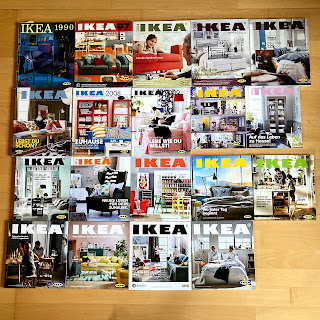Thursday, 24 December 2020
Comfort and Joy
Monday, 14 December 2020
What's Swedish for Goodbye?
Last week, it was announced, amid much over-use of the word "iconic", that the IKEA Catalogue was going into retirement after 70 years' sterling service. I thought I'd take the opportunity to dig out my collection which probably isn't quite iconic, but does span four decades - and sits in an IKEA box upstairs in my IKEA-furnished office.
The first catalogue I have is from 1990:
This pre-dates my arrival in Germany, but I saw plenty of the black, deep blue and purple look for interiors in my first few years here. Check out this black leathery office:
The first catalogue that came legitimately into my postbox (I suspect I saved the 1990 deep blue horror from a clear-out at the IKEA offices at some point) was the 1997 edition - still in DM, note.
Many items from this catalogue featured in my first flat here in Germany - and some survive, handed down to my son, who set up his first flat a year ago. Think they call that "circular economy" these days. The catalogue also featured what I think was the first PS Collection:
Bauhaus, eat your heart out! Moving into the 21st century, and the year we set up house - 2004:
I bought several items from this Kingdom of Children collection - note: no pink Princesses:
In 2010, the catalogue shrank a little in overall dimensions, but the cover took an expansive approach:
Which brings me to the latest example I have - behind the times as ever, I only have the 2020 edition, not the very last one:
I am sure there will be people who will be pleased to see the back of the IKEA catalogue. Well, here you are. Note the LACK table's decrease in price from 1997 (DM) to 2007 to 2010.
As they say in Sweden:
Hej då!
Monday, 7 December 2020
A brand with a view
I've always been a little queasy about the idea of brand loyalty, for reasons outlined in this post from 2013. Relationships, loyalty, Lovemarks - the whole tra-la-la. Interesting enough as an analogy, maybe, to kick off thinking, but in the end, brands ain't people. You don't get much back for your investment of faithfulness and duty.
Amazon demonstrate this again and again, despite all their claims to be the most customer-centric company in the solar system, or whatever it is. I've been writing book reviews for at least a decade and a half, and once reached the dizzy heights of being a Top 1000 reviewer, which I mistakenly took for recognition from my book-loving chums at Amazon. This year I was brought down to earth. My reviews, in English, of English language books, are no longer accepted by the UK or US sites.
Why? It's transactional - and illogical. I spend buckets of money (yes, I know, I'm not proud) for Kindle books, but this all goes over the German site. So I can only post my reviews there. OK, not the end of the world, in the great scheme of things, but it makes me feel a touch miffed.
Still, despite evidence to the contrary, the brand-as-human business isn't going away. In the last couple of years, it's taken on another form, which is possibly more alarming than all the brand-as-best-friend, brand-as-enabling-partner tosh.
Call it brand activism, purpose campaigning, venturing into the social and cultural space (why is everything a space these days?), taking a stance, having a point of view - brands are turning up the righteousness level on the virtual latter-day sandwich board of what should surely be re-named "political media".
This is bad enough, and of course you can ignore most of this guff, but the alternative is presented as "staying silent" or "bland corporate statements" - an implication of "if you're not with us, you're against us."
Well, I'd say this isn't the alternative. For me the alternative is to put the creative and media money and effort into creating distinctive, entertaining, useful or informative communications that sell the brand and grow the business.
Brand values are one thing, although whether these are distinctive is up for debate. Who doesn't want to have integrity and honesty? But a point of view? A human being has a point of view. A brand is not a human being, despite all the useful analogies. And as for the people who work for that brand - well, they are likely as not going to have different points of view. And this is a good thing.
Insisting on a party line for a brand is absurd - and will only serve to make the world a dull place indeed.

















